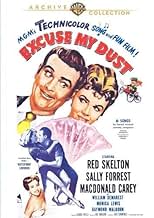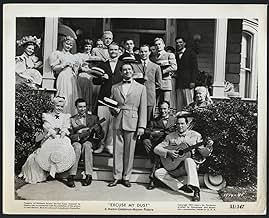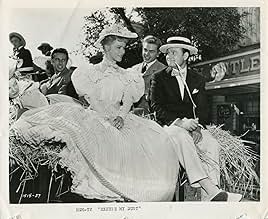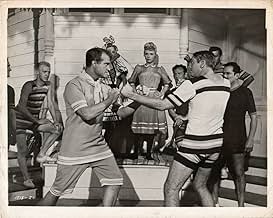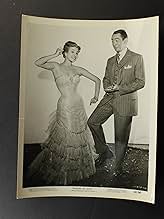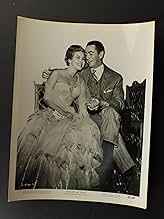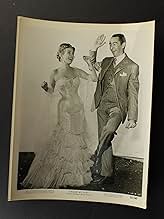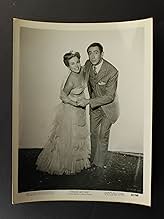CALIFICACIÓN DE IMDb
6.0/10
428
TU CALIFICACIÓN
En 1895, un inventor de pueblo enfrenta burlas por su auto a gasolina. Su novia lo apoya, pero el éxito trae complicaciones románticas. Durante una carrera de vehículos sin caballos, necesit... Leer todoEn 1895, un inventor de pueblo enfrenta burlas por su auto a gasolina. Su novia lo apoya, pero el éxito trae complicaciones románticas. Durante una carrera de vehículos sin caballos, necesita la ayuda de ella.En 1895, un inventor de pueblo enfrenta burlas por su auto a gasolina. Su novia lo apoya, pero el éxito trae complicaciones románticas. Durante una carrera de vehículos sin caballos, necesita la ayuda de ella.
- Dirección
- Guionistas
- Elenco
Herbert Anderson
- Ben Parrott
- (as Guy Anderson)
Jessie Arnold
- Woman on Street
- (sin créditos)
Polly Bailey
- Woman on Street
- (sin créditos)
Opiniones destacadas
Watching Excuse My Dust I couldn't help thinking that this would have been a better vehicle for that other redheaded comedian Danny Kaye. The character of the inventor would have suited Kaye's persona far better than Red Skelton.
That being said Red did well enough with this comedy set in those Gay Nineties when he's one of many people who are starting to experiment with the horseless carriage. He might not follow through well enough with the execution, but he's definitely got the right idea as he's got prototype vacuum cleaners and garbage disposal machines as well.
But when you're courting Sally Forrest and her father William Demarest makes his living with a livery stable that causes most of Red's problems. Not to mention pretentious vamp Monica Lewis who's from St. Louis, but her year abroad has her sporting a French accent.
I have to single out MacDonald Carey who looks like he was having a ball playing Red's rival in romance and racing. All Carey had to do was grow a handlebar mustache long enough for twirling. He was doing a great Snidely Whiplash.
Excuse My Dust is a pleasant enough Red Skelton comedy. Arthur Schwartz and Dorothy Fields wrote some rather forgettable songs. Danny Kaye could have gotten in on the musical numbers.
But Skelton fans will like this.
That being said Red did well enough with this comedy set in those Gay Nineties when he's one of many people who are starting to experiment with the horseless carriage. He might not follow through well enough with the execution, but he's definitely got the right idea as he's got prototype vacuum cleaners and garbage disposal machines as well.
But when you're courting Sally Forrest and her father William Demarest makes his living with a livery stable that causes most of Red's problems. Not to mention pretentious vamp Monica Lewis who's from St. Louis, but her year abroad has her sporting a French accent.
I have to single out MacDonald Carey who looks like he was having a ball playing Red's rival in romance and racing. All Carey had to do was grow a handlebar mustache long enough for twirling. He was doing a great Snidely Whiplash.
Excuse My Dust is a pleasant enough Red Skelton comedy. Arthur Schwartz and Dorothy Fields wrote some rather forgettable songs. Danny Kaye could have gotten in on the musical numbers.
But Skelton fans will like this.
MGM was never a good studio for slapstick comedians, but this time they got it right. Red Skelton had the misfortune to appear in a group of inept comedies for MGM which missed the mark for the most part. This comedy is terrific and Skelton is terrific in it. The comedy is set at the turn of the 20th Century with Skelton as an ambitious, but accident prone, inventor working on an early automobile. Although he is not given much in the way of witty dialogue, he is given ample opportunity to show his physical comedy skills. Although he plays a misunderstood dreamer, Skelton does not play a total nincompoop. While still a mugging comedian, he is likable and sympathetic. The supporting cast is just right with Macdonald Carey as Skelton's rival, Herbert Anderson as Skelton's straight man, Sally Forrest as his love interest and supporting character actors William Demarest and Raymond Walburn adding to the comedy. Monica Lewis is cast as the soubrette and is given two clever specialty numbers by Arthur Schwartz and Dorothy Fields. Forrest is given a good dance specialty. Skelton gets to sing the best song in the score, "Spring Has Sprung". The screenplay contains some clever satire concerning the industrial age, and, of course, there is the obligatory auto race at the end of the picture. The Technicolor photography is beautiful, but it does not take away from the comedy. This is a really fine, feel good, slapstick opus.
Red plays an inventor who has been working on building a very early internal combustion gasoline auto (the 1890s). However, he fails again and again and everyone in town thinks he's a nut. Late in the film he finally perfects his car and enters 'the big race' to prove everyone is wrong.
Red Skelton did some very charming and funny films. However, "Excuse My Dust" is a rare miss--mostly because the studio (MGM) wouldn't allow him to be who he was. Skelton was a comic--and one who had a great knack for getting the audience to like him. However, here the writers didn't respect Skelton for who he was and instead tried to fit him into the MGM mold--with lots of beautiful Technicolor and lots of songs. Skelton was not a singer (his voice wasn't bad but this was obviously NOT why he was in films) and they tried to make it a musical comedy not a comedy--a serious mistake. All too often, humor seems (at best) secondary and the film has very few laughs--too few. Additionally, the film had way too much plot--and often (such as during the big race near the end) the plot seemed more important than laughs or his character. So what we're left with is a pretty looking film with lots of music and few laughs. Because of this, I recommend you try one of his other films--such as "Watch the Birdie" or "The Yellow Cab Man".
Red Skelton did some very charming and funny films. However, "Excuse My Dust" is a rare miss--mostly because the studio (MGM) wouldn't allow him to be who he was. Skelton was a comic--and one who had a great knack for getting the audience to like him. However, here the writers didn't respect Skelton for who he was and instead tried to fit him into the MGM mold--with lots of beautiful Technicolor and lots of songs. Skelton was not a singer (his voice wasn't bad but this was obviously NOT why he was in films) and they tried to make it a musical comedy not a comedy--a serious mistake. All too often, humor seems (at best) secondary and the film has very few laughs--too few. Additionally, the film had way too much plot--and often (such as during the big race near the end) the plot seemed more important than laughs or his character. So what we're left with is a pretty looking film with lots of music and few laughs. Because of this, I recommend you try one of his other films--such as "Watch the Birdie" or "The Yellow Cab Man".
It's 1895 Willow Falls, Indiana. Inventor Joe Belden (Red Skelton) is creating his gasomobile. It's a horse-less carriage. Only, it never seems to work and he sets his own barn on fire. Liz Bullitt is his girlfriend. Her horse ranch owning father is opposed to him and prefers her other suitor Cyrus Ransom, Jr.
The biggest name in the credits seems to be Buster Keaton as an uncredited writer and director. I do wonder about the story behind the scene. There are a lot of cooks in this kitchen. I would probably work harder on getting better songs. They're ok but rather old fashion. They are songs from the late 19th century to the jazz age. Red Skelton is doing the good-natured goof without going too wacky. There is a car race at the end. It's not the most exciting, but it is interesting to see all the old cars. This is a nice lesser musical with little lasting effect.
The biggest name in the credits seems to be Buster Keaton as an uncredited writer and director. I do wonder about the story behind the scene. There are a lot of cooks in this kitchen. I would probably work harder on getting better songs. They're ok but rather old fashion. They are songs from the late 19th century to the jazz age. Red Skelton is doing the good-natured goof without going too wacky. There is a car race at the end. It's not the most exciting, but it is interesting to see all the old cars. This is a nice lesser musical with little lasting effect.
In reviewing the so-called golden age of the MGM musical, sometimes it's instructive to bypass the big, accomplished, but pretentious famous titles (An American In Paris, The Band Wagon, On the Town, Kismet) and skip to the smaller movies produced by someone other than Arthur Freed. This 1951 tuner from the Jack Cummings unit is probably Red Skelton's best movie, which may not be saying much, but it's a very smart and pleasing little musical that doesn't wear out its welcome (it's a trim 80 minutes or so). Red's dopey slapstick is kept to a minimum (just two set pieces, at the beginning and the end), and what's in between is surprisingly gentle and well-written Americana -- in sunny Technicolor. The underrated score, by Dorothy Fields and Arthur Schwartz (who wrote another wonderful score for Broadway that year, the equally underrated "A Tree Grows In Brooklyn"), is solidly integrated into the plot, and the musical staging, by Hermes Pan, is bright and inventive. (The movie contains what may be the least plot-motivated "dream ballet" ever, but even it's quick and unpretentious.) Sally Forrest is pretty as a picture and a heck of a dancer, and Monica Lewis socks two comedy numbers across. They will help you past the dum-dum physical comedy that was Skelton's stock in trade.
It's no award-winner, nor did it do much at the box office, but it holds up much better than some of the bigger, weightier MGM titles.
It's no award-winner, nor did it do much at the box office, but it holds up much better than some of the bigger, weightier MGM titles.
¿Sabías que…?
- TriviaThe original "Morgan" automobile in Soberbia (1942) was also used in this film.
- ErroresA few times during the race, wide tire tracks from more modern automobiles can be seen on the dirt roads.
- ConexionesFeatured in The Metro-Goldwyn-Mayer Story (1951)
- Bandas sonorasI'd Like to Take You Out Dreaming
Music by Arthur Schwartz
Lyrics by Dorothy Fields
Performed by Macdonald Carey and Chorus
Selecciones populares
Inicia sesión para calificar y agrega a la lista de videos para obtener recomendaciones personalizadas
Detalles
Taquilla
- Presupuesto
- USD 1,789,000 (estimado)
- Tiempo de ejecución1 hora 22 minutos
- Relación de aspecto
- 1.37 : 1
Contribuir a esta página
Sugiere una edición o agrega el contenido que falta

Principales brechas de datos
By what name was Hombre de calamidades (1951) officially released in India in English?
Responda

